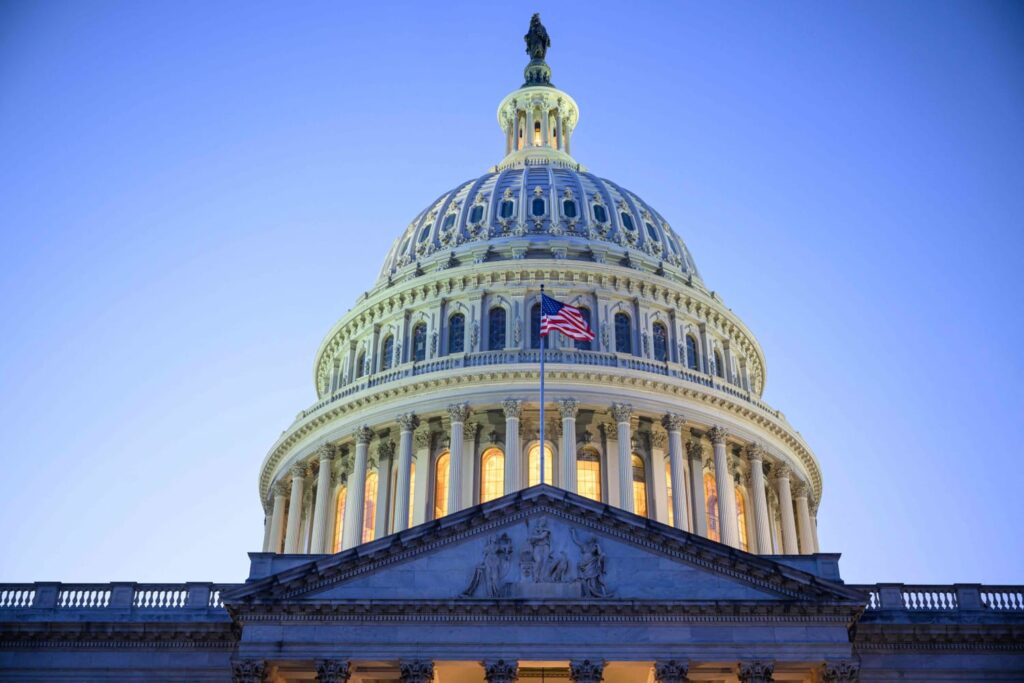WASHINGTON – Congressional leaders and President Joe Biden announced a deal Tuesday morning to fund the government ahead of a weekend deadline, breaking an impasse over funding for the Department of Homeland Security that had put talks on hold. did.
Chairman Mike Johnson (R-Louisiana) announced the DHS agreement in a statement, saying it will allow Congress to finish funding the government for the remainder of the fiscal year that ends in September. “The House and Senate committees have begun drafting the text of the bill, which will be prepared for presentation and consideration by the full House and Senate as soon as possible,” he said.
Senate Majority Leader Chuck Schumer of New York echoed the news of the agreement, saying the two chambers are currently “finalizing documents and reports for Congress to review and consider as soon as possible.” Ta.
Details were not immediately disclosed.
Congress will need to act quickly. Funding for the Departments of State, Defense, Homeland Security, Labor, Health and Human Services, and many other departments is set to expire Saturday morning. Five other funding bills were effectively resolved by the end of last week, but only the Homeland Security bill highlighted deep differences that Republicans and Democrats were unable to resolve.
Three sources familiar with the negotiations confirmed to NBC News on Monday night that the deal would include a full-year DHS funding bill, rather than the stopgap measure that negotiators had previously considered. Become.
It will still be difficult for Congress to pass a spending package on time. Prime Minister Boris Johnson said he would give MPs 72 hours to read the text before voting. The Senate will then seek unanimous consent from all members to vote on the bill by 11:59 p.m. ET on Friday to avoid a partial government shutdown the next day.
“We have reached an agreement with Congressional leaders on how to proceed with the remaining funding bill,” Biden said. “The House and Senate are currently working on a final version that can be brought to the floor quickly, and I intend to sign it immediately.”
Negotiators headed into the weekend to issue a package that would largely maintain the status quo and provide separate funding to DHS as an extended stopgap before resuming negotiations on a full-year funding bill for the department through the end of September. He was about to make an announcement.
A person familiar with the negotiations said the White House and other Democrats want to increase border security and border enforcement enforcement funding, but another person said Republicans want to move DHS funding toward the agency's core resources. He said he wanted to reprioritize the mission, but gave no details.
House Minority Leader Hakeem Jeffries of New York emphasized that the DHS provisions were negotiated between the White House and Republicans.
“Following the completion of negotiations between the Biden Administration and House Republicans regarding the diversion of Homeland Security funding, House and Senate negotiators have reached agreement in principle on the remaining six spending bills for fiscal year 2024,” he said. Ta.
Congress split the federal funding process into two parts and passed the first part of the bill earlier this month. The political salience of immigration, especially among conservatives, became a minefield for Johnson.
On Monday afternoon, two leaders of the far-right group Freedom Caucus, Rep. Bob Good (R-Va.) and Rep. Chip Roy (R-Texas), published a letter from 41 Republicans, saying: He called for “core elements” to be included in the DHS funding bill. HR 2, the Securing Borders Act,” or Biden’s immigration policies, will not change, they said.
“Therefore, we ask that you please join us in rejecting any appropriations package (or similar) that will be introduced in the House of Representatives that directly funds these disastrous policies, and instead We ask you to choose to stand against this attack,” they wrote.
Far-right lawmakers are widely expected to vote against the bill, and their votes are not needed to form the bipartisan coalition needed to pass it. But if these members get angry enough, it could cause a political headache for Mr Johnson.
It is highly unusual for Congress to continue haggling over government funds nearly six months into the fiscal year. Funding for fiscal year 2025 is expected by the end of September.


